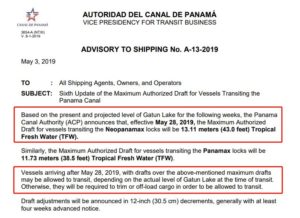Importers along the East Coast have many annual requirements and concerns, one of which is keeping a lookout for changes along the Panama Canal. What sort of changes are problematic? Weight restrictions primarily. Weight restrictions it’s an issue that creates a serious problem for specific commodities.
These are issues that have manifested in the past and will continue to manifest in the future. Weight restrictions are the direct result of dry seasons, an issue that now different importers and shippers will need to be aware of so they are prepared to tackle it, particularly in the current season.
Past Restrictions in the Panama Canal
In the past, there have been restrictions in the Panama Canal that are very similar to the restrictions shippers are experiencing today. Shippers and importers alike are starting to come across restrictions that specifically target the size of cargo. In the past, some restrictions required that containers offload some of their weight prior to arriving at the Panama Canal. In certain times of dry weather, restrictions have been present to the same degree that they’re present now, however the bigger size of ships today is now an influence. In the past these weight restrictions in the Canal did not affect as many shippers nor did it reach such a widespread array of businesses.
Cause of Current Dry Season
In this part of the world, they experience the El Niño phenomenon. The weather patterns during El Niño create drier than normal or wetter than normal conditions depending on the region, creating problems for shippers and importers alike.
The 1997/1998 season is currently considered the worst season on record, it has been extremely dry and resulting in a series of widespread blackouts. But today that record is being challenged by the current season. The first quarter of 2019 has been one of the driest seasons recorded in over 106 years. On April 30, 2019, an advisory was posted specifying a maximum draught for transitioning new locks. The restriction is now 44 feet for tropical freshwater.
Weight Limit Restrictions Caused as a result of Dry Period
Clearly, these weight restrictions caused by dry periods around the world are not an issue that any individual importer can change. Nonetheless, importers continue to be impacted by it and a lot of business stands to be lost as a direct result.
What does this mean for importers who have cargo? Well, for those that have 20’ DC cargo, it means a weight limit that is now 7,000 kg. For importers that have 40’ DC cargo that weight limit is 15,000 kg. Steamship lines will also have to make adjustments and any vessels that arrived after April 30, 2019, and exceed 44 feet will have to trim or offload some of their cargo before they get to the Panama Canal, especially if these water levels remain insufficient at the time that they cross.
Unfortunately, there is no way to know ahead of time if the levels will remain insufficient and if it will be necessary to offload cargo beforehand. Shippers are faced with a serious dilemma whereby they need to create a Plan B but they have no way of knowing whether or not they will need it until the moment arises.
Impact on Shippers
Vessels that are carrying less than 5,000 TEU will not be as heavily impacted by such draft restrictions but the problem is there are very few vessels shipping cargo today that fall under this size. Most vessels that are currently built are much larger than this so shippers have a much bigger ongoing problem to tackle not just this year but in the years to come.
In fact, efficiency was one of the main drivers that shippers and importers had to work on. The result of overcoming that issue was simply to create bigger ships with larger cargo capacity. But now that solution brings with it a whole new set of problems specifically as it relates to Panama Canal weight restrictions.
Measures Taken to Reduce Impact of Dry Season
Measures to reduce the impact of the dry season in the Panama Canal have already been taken. First and foremost they have utilized water-saving basins. They have also closed the Gatun hydropower station. The implementation of a Panamax water conservation program has already been initiated.
This means not using the hydraulic assist at the locks and not using tandem lockage whereby two ships are in one lockage. It also includes not using the chamber cross filling stations. Currently, the Panama Canal Authority has tried to conserve water to avoid any unnecessary negative impact on business but the drought has already caused the Panama Canal Authority to announce several draft restrictions since January 2019. It is important to understand that during the dry season these draft adjustments are typically announced in 12-inch decrements at a time. The announcements come at least four weeks ahead of time so shippers and importers have a modicum of advance notice.

That said, it will now be up to shippers to pay diligent attention to any changes, restrictions, and updates from the Panama Canal Authority so they can implement backup plans if and when necessary. Tangentially having a backup plan at the ready is imperative to overcoming the issues that arise when weight restrictions are announced by the Authorities. They are doing their best to provide updates in advance. Shippers and importers alike have to be prepared for additional restrictions to come this and future seasons.




